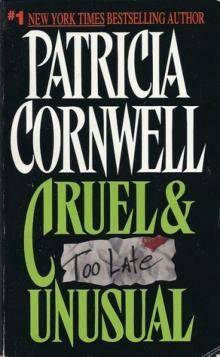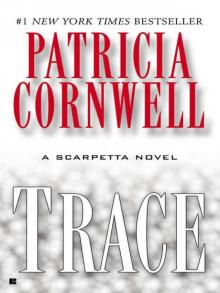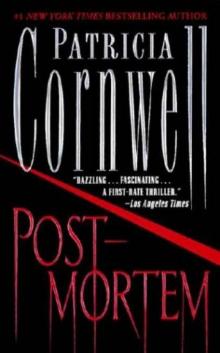- Home
- Patricia Cornwell
Postmortem Page 3
Postmortem Read online
Page 3
“Do you blame yourself, Benton?”
“We’ve been through this. And I’ve had no sleep,” he answered.
“Yes, we’ve been through all sorts of facts and possibilities. Such as you’ve never allowed yourself a chance to feel the personal insult of what Marino did to Kay, who you quickly married afterwards. Maybe too quickly? Because you felt you had to hold everything together, especially since you didn’t protect her, didn’t prevent it? No different than what you do when you handle a criminal case, really. You take over the investigation, handle it, micromanage it, keep it a safe distance from your psyche. But the same rules don’t apply in our personal lives. You’re telling me you have homicidal feelings toward Marino, and in our last several conversations, we’ve delved into what you call your sexual acting out with Kay, although she isn’t necessarily aware of it, is that still correct? Nor is she aware that you’re aware of other women in a way that’s unsettling to you? Still true?”
“It’s normal for men to feel attractions they don’t do anything about.”
“Only men do that?” Dr. Thomas asked.
“You know what I mean.”
“What’s Kay aware of?”
“I’m trying to be a good husband,” Benton said. “I love her. I’m in love with her.”
“Are you worried you’ll have an affair? Cheat?”
“No. Absolutely not. I would never do that,” he said.
“No. Not. Never. You cheated on Connie. Left her for Kay. But that was a long time ago, wasn’t it.”
“I’ve never loved anybody as much as I love Kay,” Benton said. “I would never forgive myself.”
“My question is whether you completely trust yourself.”
“I don’t know.”
“Do you completely trust her? She’s very attractive, and now she must have a lot of fans because of CNN. A powerful, good-looking woman can have her pick. What about her trainer? You said you can’t stand the thought that he puts his hands on her.”
“I’m glad she’s taking care of herself, and a trainer’s a good thing. Prevents people from injuring themselves, especially if they’ve never worked with weights and aren’t twenty years old.”
“I believe his name is Kit.”
Benton didn’t like Kit. He always found excuses not to use the gym in their apartment building if Scarpetta was working out with Kit.
“Truth of the matter,” Dr. Thomas said. “Whether you trust Kay or not, it won’t change her behavior. That’s her power, not yours. I’m more interested in whether you trust yourself.”
“I don’t know why you continue to push me on this,” Benton said.
“Since you got married, your sexual patterns have changed. At least that’s what you told me the first time we talked. You find excuses not to have sex when the opportunity is there, and then want it when you, quote, shouldn’t. Again, what you told me. Still true?”
“Probably,” Benton said.
“That’s one way to pay her back.”
“I’m not paying her back for Marino. Jesus Christ. She didn’t do anything wrong.” Benton tried not to sound angry.
“No,” Dr. Thomas said. “I think it’s more likely you’re paying her back for being your wife. You don’t want a wife. You never have, and that’s not what you fell in love with. You fell in love with a powerful woman, not a wife. You’re sexually attracted to Kay Scarpetta, not to a wife.”
“She’s Kay Scarpetta and my wife. In fact, in many ways, she’s more powerful than she’s ever been in her life.”
“It’s not the rest of us who need convincing, Benton.”
Dr. Thomas always gave him special treatment, meaning she was more aggressive and confrontational than she was with her other patients. She and Benton shared a commonality that went beyond their therapeutic bond. Each understood how the other processed information, and Dr. Thomas could see right through linguistic camouflage. Denial, evasion, and passive communication simply weren’t options. Long sessions of silent staring as the shrink waited for an uptight patient to launch into what was bothering him weren’t going to happen. One minute into the void, and she was going to prompt Benton as she did last time: Did you come here for me to admire your Hermès tie? Or do you have something on your mind? Maybe we should pick up where we left off last time. How’s your libido?
Dr. Thomas said, “And Marino? Will you talk to him?”
“Probably not,” Benton said.
“Well, it seems you have a lot of people not to talk to, and I’ll leave you with my quirky little theory that at some level we intend everything we do. That’s why it’s extremely important to root out our intentions before they uproot us. Gerald’s waiting for me. Errands. We’re having a dinner party tonight, which we need like a hole in the head.”
It was her way of saying “Enough.” Benton needed to process.
He got up from his desk and stood before his office window, gazing out at the leaden winter afternoon. Nineteen floors below, the hospital’s small garden was barren, its concrete fountain dry.
3
GOTHAM GOTCHA!
Happy New Year, everyone!
My resolution is all about you—what will really grab you, and as I was mulling it over . . . ? Well, you know how they roll back the year? Remind us of every awful thing that happened so we can get depressed all over again? Guess who filled my to-die-for fifty-eight-inch HD Samsung plasma TV?
The to-die-for queen herself: Dr. Kay Scarpetta.
Walking up courthouse steps to testify in another sensational murder trial. Her sidekick investigator Pete Marino in tow—meaning the trial was at least six, seven months ago, right? I think we all know the poor fat maggot’s not her sidekick anymore. Has anybody seen him? Is he in a cosmic jail somewhere? (Imagine working for a forensic diva like Scarpetta. Were it me, I might just commit suicide and hope she’s not the one who does the autopsy.)
Anyway, back to her walking up the courthouse steps. Cameras, the media, wannabes, spectators everywhere. Because she’s the expert, right? Gets called in from here to Italy because who better? So I poured another glass of Maker’s Mark, cranked up Coldplay, and watched her for a while, testifying in that pathological language of hers so few of us understand beyond getting the drift that some little girl was raped from stem to stern, even found seminal fluid in her ear (thought you could get that only from phone sex), and her head was bashed against the tile floor and blunt force trauma was what killed her. It dawned on me:
Who the hell is Scarpetta, anyway?
If you took away the hype, would there be anything behind it?
I began doing a little research. Start with this. She’s a politico. Don’t fall for bullshit about her being a champion for justice, a voice for those who can no longer speak, the lady physician who believes in “First Do No Harm.” (Are we absolutely sure Hippocrates isn’t where the word hypocrite comes from?) Fact is, Scarpetta’s a megalomaniac who manipulates us on CNN into believing she’s serving an altruistic social service when the only thing she’s serving is herself. . . .
Scarpetta had seen enough and dropped her BlackBerry into her handbag, disgusted that Bryce had suggested she look at such rot. She was as annoyed with him as she would be if he had written it, and she could have done without his critique of the photograph that accompanied the column. Although the display on her BlackBerry was small, she saw enough to get a good impression of what he’d meant when he’d said the photograph was unflattering.
She looked like a she-devil in bloody scrubs, a face shield, a disposable hair cover reminiscent of a shower cap. Her mouth was open mid-sentence, her bloody gloved hand pointing a scalpel, as if she was threatening someone. The black rubber chronograph watch she was wearing was a birthday gift from Lucy in 2005, meaning the photograph had been taken at some point in the last three and a half years.
Taken where?
Scarpetta didn’t know. The background had been whited out.
“Thirty-four dollar, twenty cent,”
her driver said loudly as the taxi abruptly halted.
She looked through her side window at the closed black iron front gates of Bellevue’s former psychiatric hospital, a foreboding red-rock building some two centuries old that hadn’t seen a patient in decades. No lights, no cars, nobody home, the guard booth behind the fence empty.
“Not here,” she said loudly through the opening in the Plexiglas partition. “Wrong Bellevue.”
She repeated the address she’d given him when he’d picked her up at La Guardia, but the more she explained, the more insistent he got, jabbing his finger at the entrance, where Psychiatric Hospital was carved in granite. She leaned closer to him, directing his attention several blocks ahead where tall buildings were etched in gray, but he was bullish in his bad English. He wasn’t taking her anywhere else, and she must get out of the cab right now. It entered her mind that he truly didn’t know that the Bellevue Hospital Center wasn’t this creepy old horror that looked like something out of One Flew over the Cuckoo’s Nest. He probably thought his passenger was a psychiatric patient, a criminally insane one suffering a relapse. Why else would she have luggage?
Scarpetta decided she’d rather walk the rest of the way in arctic blasts of wind than deal with him. Paying the fare, she got out of the cab, shouldered two bags, and began rolling her suitcase full of home cooking along the sidewalk. She pressed a button on her wireless earpiece.
“I’m almost here—” she started to tell Benton. “Dammit!” Her suitcase flopped over as if someone shot it.
“Kay? Where are you?”
“I just got thrown out of a taxi—”
“What? Thrown out of what? You’re breaking up . . .” he said, right before the battery went dead.
She felt like a homeless person as she struggled with her luggage, the suitcase falling over every other minute, and when she’d bend down to set it upright, her other bags would slide off her shoulders. Cold and irritable, she made her way to the modern Bellevue at First Avenue and East 27th, a full-service hospital center with a glass atrium entrance, a garden, a renowned trauma unit and ICU, and a forensic psychiatric floor for male patients whose alleged crimes ranged from jumping a turnstile to murdering John Lennon.
The phone on Benton’s desk rang just minutes after he and Scarpetta were disconnected. He was sure it was her, trying him back.
“What happened?” he said.
“I was about to ask you that.” Jaime Berger’s voice.
“I’m sorry. I thought you were Kay. She’s having some problem—”
“I’d say. Nice of you to mention it when we spoke earlier. Let’s see. That would have been six, seven hours ago? Why didn’t you say something?”
Berger must have read Gotham Gotcha.
“It’s complicated,” Benton said.
“I’m sure it is. We have a number of complications to deal with. I’m two minutes from the hospital. Meet me in the cafeteria.”
Pete Marino’s one-bedroom walk-up in Harlem was close enough to Manna’s Soul Food that he lived and breathed fried chicken and short ribs. It was unfair to a man whose deprivation of food and drink had created an insatiable appetite for everything he couldn’t have.
His makeshift dining area was a TV tray and straight-back chair overlooking the constant traffic on Fifth Avenue. He stacked deli turkey on a slice of whole-wheat bread, which he folded in half and dipped into a puddle of Nathan’s Coney Island mustard on a paper plate. He drank a Sharp’s nonalcoholic beer, about a third of the bottle in two swallows. Since he’d fled from Charleston, he’d lost fifty pounds and certain parts of his personality. Boxes of biker clothes, including an impressive collection of Harley-Davidson leather, went to a bazaar on 116th Sreet, where in exchange he got three suits, one blazer, two pairs of dress shoes, and a variety of shirts and ties, all knockoffs made in China.
He no longer wore his diamond stud, leaving a tiny hole badly located in his right earlobe, which somehow seemed a symbol of his have-not, off-center life. He’d quit shaving his scalp as smooth as a bowling ball, and what gray hair hadn’t abandoned him circled his large head like part of a tarnished silver halo held up by his ears. He’d made a pact to give up women until he was ready, and his motorcycle and pickup truck were pointless when there was no place to park, so he’d given them up, too. His therapist at the treatment center, Nancy, had helped him comprehend the importance of self-control in his day-to-day interactions with other people, no matter what was wrong with them or what they had coming to them.
She said in her descriptive way that alcohol was the lighted match that ignited the bonfire of his anger, and had gone on to explain that his drinking was a fatal disease he’d acquired honestly from his blue-collar, uneducated, and inadequate father who got drunk and violent every payday. In short, Marino had inherited this fatal disease, and based on the brisk business at every bar and liquor store he quickly walked past, it was an epidemic. He decided it had been around since the Garden of Eden, where it wasn’t an apple but a bottle of bourbon that the snake had given to Eve, which she in turn had shared with Adam, and that had led to sex and being thrown out of paradise with nothing but the fig leaves on their backs.
Nancy warned Marino if he didn’t religiously attend AA meetings, he would become a dry drunk, which was an individual who got angry, nasty, compulsive, and out of control without the benefit of a six-pack or two. The nearest gathering place of the AAs, as Marino called them, was a church not far from the Professional African Hair Braiding Center, and therefore quite convenient for him. But he hadn’t become a regular or even an irregular. When he’d first moved here, he’d attended three times in three days, uncomfortable as hell when the participants, suspiciously kind and friendly, had gone around the room, introducing themselves, giving him no choice but to solemnly swear himself in, as if he were on trial.
My name’s Pete and I’m an alcoholic.
Hi, Pete.
He sent Nancy e-mails explaining that it went against the nature and training of a cop to confess to anything, especially in a room packed with strangers, any one of whom might turn out to be a potential dry-drunk shitcan Marino might have to lock up someday. Besides, it had taken only three meetings for him to complete all twelve steps, although he’d decided against making a list of persons he’d harmed and making amends. His reason was step nine, which clearly stated that one shouldn’t make amends if it would only further injure whoever had been harmed, and he decided that was everyone.
Step ten was easier, and he had filled an entire notebook with the names of those who had wronged him throughout his life.
He hadn’t included Scarpetta on either list until a strange coincidence occurred. He found the apartment where he now lived, made a deal with the landlord to lease it at an affordable price in exchange for services, such as handling evictions, only to discover the location was so close to former President Bill Clinton’s office that Marino often walked past the fourteen-story building on his way to the subway station at 125th and Lenox. Thinking of Bill Clinton caused Marino to think of Hillary Clinton, and that caused him to think about women who were powerful enough to be the president or some other world leader. That led to thoughts of Scarpetta.
It had gotten to where he almost confused the two in his fantasies. He would see Hillary on CNN, then see Scarpetta on CNN, and by the time he changed channels in a desperate attempt to divert his attention with ESPN or maybe a pay-per-view movie, he was depressed. His heart would ache like an abscessed tooth. He would obsess about Scarpetta and the lists she wasn’t on. He would jot her name on one list, then scratch through it and jot it on the other. He fantasized about what it would be like if she were president. He would suddenly find himself on the Secret Service’s security threat list and have to escape to Canada.
Maybe Mexico. He’d spent several years in South Florida and could handle Spanish-speaking people better than he could those who spoke French. He’d never understood the French, and didn’t like their food. What did it say ab
out a country that didn’t have a national beer, like Budweiser, Corona, Dos Equis, Heineken, or Red Stripe?
He finished a second turkey roll-up, took another slug of Sharp’s, and watched people whose only ambitions were West Indian take-out, boutiques, juice bars, tailor shops, or maybe the nearby Apollo theater, the noise of cars, trucks, and pedestrians a jarring orchestra that Marino didn’t mind in the least. In warm weather he kept his windows open until he couldn’t stand the dust. What he avoided was silence. He’d had plenty enough of that in rehab, where he wasn’t allowed to listen to music or watch TV, couldn’t fill his head with anything but the confessions of drunks and drug addicts, and his own haunted thoughts and memories of embarrassingly naked talks with Nancy.
He got up from his chair and collected his soggy paper plate, his napkin, his empty Sharp’s bottle. The kitchen was no more than six steps away, with a small window above the sink that afforded him a view of artificial turf-covered concrete and aluminum tables and chairs surrounded by a chain-link fence—what was advertised as the apartment building’s backyard.
On the counter was his computer, and he read the gossip column from this morning that he’d saved on the desktop, determined to discover who was behind it, then find the scumbag and do something that would rearrange his or her body parts permanently.
No investigative tool he knew of worked. He could Google Gotham Gotcha until the cows came home, and nothing that popped up told him a damn thing he didn’t already know. It was useless trying to trace the columnist through the advertising companies that paid to push foods, liquor, books, electronics, movies, and TV shows. There was no pattern, only the validation that millions of fans were addicted to a fucking gossip column that this morning had made the worst episode of Marino’s life its centerpiece.
His phone rang.
It was Detective Mike Morales.
“What’s up,” Marino said.
“Data mining, bro,” Morales said in his slow, lazy way.

 Blow Fly
Blow Fly Unnatural Exposure
Unnatural Exposure The Bone Bed
The Bone Bed Book of the Dead
Book of the Dead Flesh and Blood: A Scarpetta Novel (Scarpetta Novels Book 22)
Flesh and Blood: A Scarpetta Novel (Scarpetta Novels Book 22) Red Mist
Red Mist Cruel & Unusual
Cruel & Unusual Hornet's Nest
Hornet's Nest Four Scarpetta Novels
Four Scarpetta Novels Scarpetta's Winter Table
Scarpetta's Winter Table Isle of Dogs
Isle of Dogs Trace
Trace Postmortem
Postmortem Body of Evidence ks-2
Body of Evidence ks-2 Southern Cross
Southern Cross All That Remains
All That Remains Point of Origin
Point of Origin Depraved Heart
Depraved Heart Ruth, a Portrait: The Story of Ruth Bell Graham
Ruth, a Portrait: The Story of Ruth Bell Graham From Potter's Field
From Potter's Field Flesh and Blood
Flesh and Blood Dust
Dust The Body Farm
The Body Farm Port Mortuary
Port Mortuary Quantum
Quantum Portrait of a Killer: Jack the Ripper - Case Closed
Portrait of a Killer: Jack the Ripper - Case Closed Spin (Captain Chase)
Spin (Captain Chase) Cause of Death
Cause of Death The Scarpetta Factor
The Scarpetta Factor Predator
Predator Scarpetta 18 - Port Mortuary
Scarpetta 18 - Port Mortuary Trace ks-13
Trace ks-13 Portrait of a Killer
Portrait of a Killer Cruel and Unusual ks-4
Cruel and Unusual ks-4 Cause Of Death ks-7
Cause Of Death ks-7 Dust ks-21
Dust ks-21 At Risk wg-1
At Risk wg-1 The Last Precinct ks-11
The Last Precinct ks-11 Book of the Dead ks-15
Book of the Dead ks-15 All That Remains ks-3
All That Remains ks-3 Ruth, a Portrait
Ruth, a Portrait Scarpetta's Winter Table (kay scarpetta)
Scarpetta's Winter Table (kay scarpetta) From Potter's Field ks-6
From Potter's Field ks-6 Scarpetta
Scarpetta Isle of Dogs jhabavw-3
Isle of Dogs jhabavw-3 Hornet's Nest jhabavw-1
Hornet's Nest jhabavw-1 The Body Farm ks-5
The Body Farm ks-5 Blow Fly ks-12
Blow Fly ks-12 Post Mortem
Post Mortem Five Scarpetta Novels
Five Scarpetta Novels Chasing the Ripper (Kindle Single)
Chasing the Ripper (Kindle Single) Point of Origin ks-9
Point of Origin ks-9 Port Mortuary (2010)
Port Mortuary (2010) Unnatural Exposure ks-8
Unnatural Exposure ks-8 Southern Cross uhabavw-2
Southern Cross uhabavw-2 The Bone Bed ks-20
The Bone Bed ks-20 Red Mist ks-19
Red Mist ks-19 Port Mortuary (2010) ks-18
Port Mortuary (2010) ks-18 Predator ks-14
Predator ks-14